PAX South: What I Played
I'm currently typing this in the San Antonio hostel I'm staying at, having now concluded the final day of PAX South 2016: my first convention. I have to say, overall, I had a blast. I got to see some good friends, some of whom I hadn't seen in a while. I got to meet some cool devs and learn a lot from industry experts. Most importantly, though, I got to play a lot of games. I wanted to take a moment to write out what I thought of all of the games I played or saw, grouped by my approximate reaction.
Stuff I Bought/Kickstarted:
OK, so I feel like the top of the list has to be the games I either ended up leaving the convention center with, as well as those whose active Kickstarter campaigns I went to contribute to.
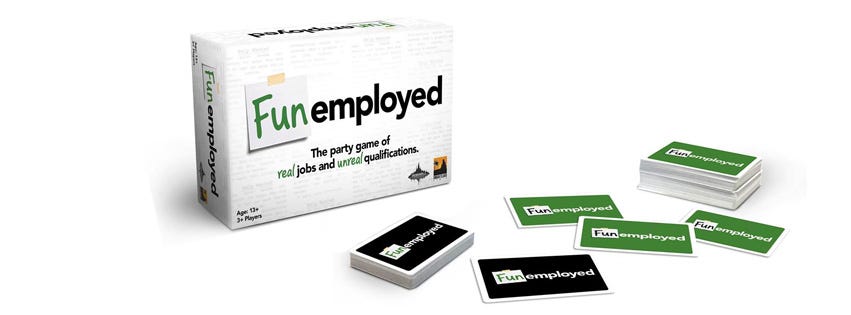
Funemployed has actually been out a little bit, and while I heard quite a bit about it, I never actually put my hands on the game. That, as it turns out, was a mistake.
Funemployed is a spin on the classic Cards Against Humanity formula, in which one player is designated as the one hiring for a job, determined by a drawn black card. Jobs range from "Astronaut" to "Magician" to "Proctologist". The other players must take turns delivering short interview pitches as to why they are the best candidate. The catch is that they must use the terms given by the four green cards in their hand, which range from "Erectile Disfunction" to "Sawed-Off Shotgun" to, my favorite, "Russian Accent".
I actually ended up busting out Funemployed quite a bit whenever I was stuck in line for a panel with my friends, and it was a blast. It was so much fun watching people struggle to try and figure out how an Erotica Collection could be worked into a Nanny job, and the characters we created were often so outlandish that the people by us in line couldn't help but watch, if not join in. My favorite character I created was Ted, who had an ice cream dungeon, and delivered his sweet treats to children in a burlap sack. I somehow ended up winning.
Funemployed is great because, not only do the permutations of cards allow for probably millions of possible hand-job combinations, but having people have to create an entire interview pitch adds an extra level of uniqueness to every single round of the game.
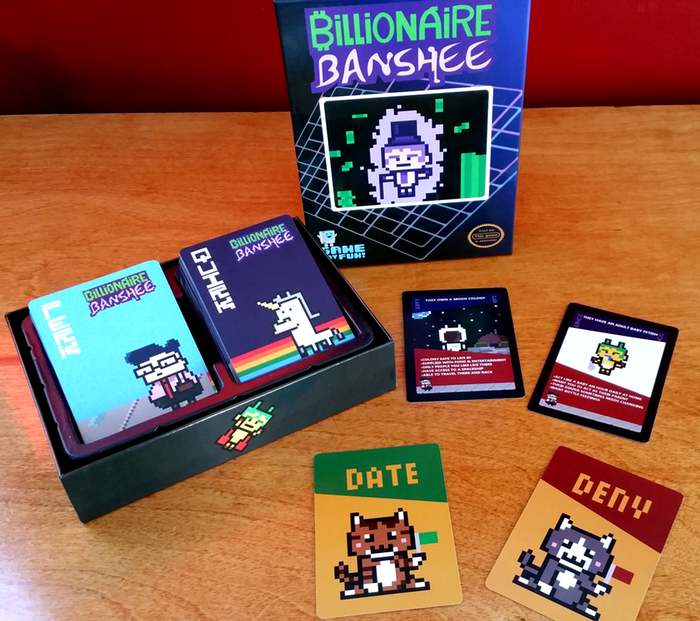
Billionaire Banshee was the other party card game I bought at PAX, after a simply amazing pitch given to me by the game's designer, Steven Bailey (who signed my box!).
Billionaire Banshee is a simple concept: players taking turns drawing two cards, one Perk, and one Quirk, which are positive and negative character traits, respectively. Each is laid out in surprising detail on the cards. Other players must then guess whether or not the player in question would date a person who had those two character traits, before the person finally reveals what they would do.
What makes Billionaire Banshee brilliant is the specificity of the Perks and Quirks. The pair Bailey laid out before me described a lover who could cure a headache of any severity by fingering my belly button, but one who exclusively wore bread bowls as shoes (which would occasionally be full of soup). As an aside, yeah, that's totally worth it. Have you ever had a migraine? Do you know how much I'd save on Advil?
All in all, Billionaire Banshee taps into my deep rooted love of Would You Rathers and ridiculous hypothetical questions, so yeah, I'd have to strongly say that this game is brilliant.
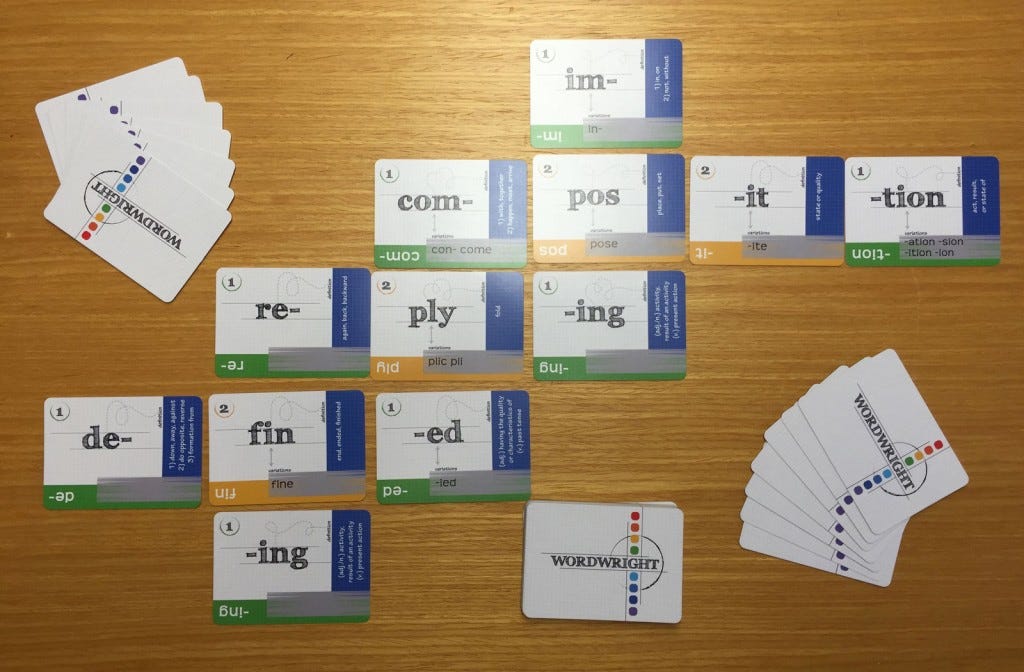
I grew up in a house that relished in word games, specifically Scrabble. Unfortunately, I'm also the worst in my family at Scrabble, and as a result, a word game that I can play alone, especially one where I can really flex my vocabulary, was a nice surprise to find on the show floor.
Wordwright has a variety of games you can play with the deck offered, but the base concept from which all of those game types is simple: the deck is composed of roots, prefixes, and suffixes, and players are rewarded for stringing those together into words.
Wordwright is a simple game, but that's not a knock against it. Rather, it makes it a fun way to force yourself to think and stretch your vocabulary a little. In fact, the creators at Defined Mind see Wordwright as a great game for teaching English, which I think is awesome.
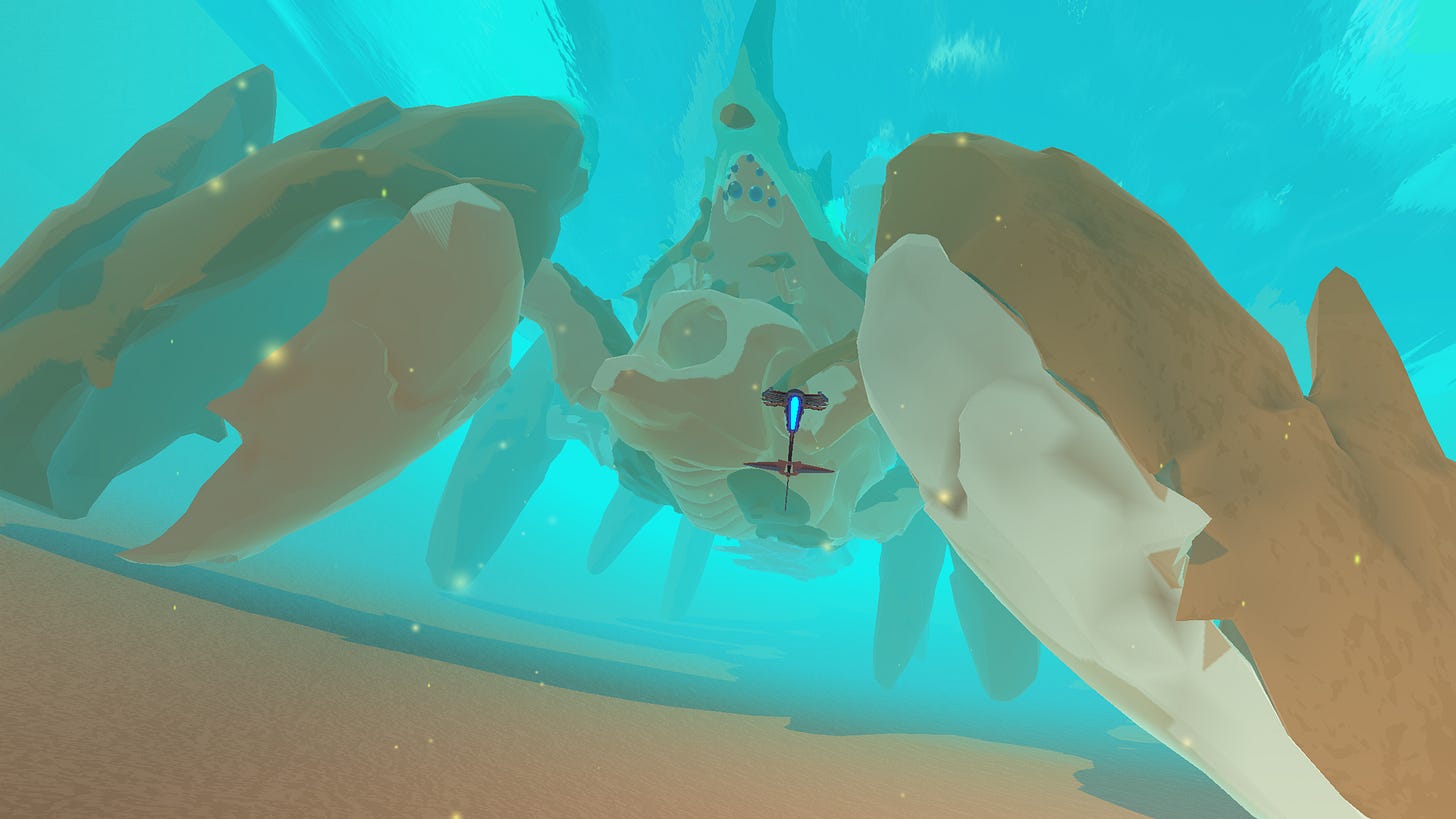
Full disclosure: I know one of the devs on InnerSpace. He's a cool dude.
Fuller disclosure: I always kinda doubted this project because of its ambition. I don't doubt it anymore.
The reason I doubted InnerSpace and PolyKnight Games is because InnerSpace sounds like a Mad Lib where you're only allowed to fill spaces with things I like. It's an open world, Shadow of the Colossus-inspired exploration game, where players get to fly around in a sweet and responsive aircraft/submarine, discovering secrets, learning about the world, defeating massive bosses, with a heavy focus on player-driven narrative.
The glimpse of InnerSpace I saw at PAX (although, I'd admit that a show floor isn't maybe the optimal place to experience what I'd consider a low speed, high personal commitment game) was extremely interesting. The flying feels pretty great, especially with the ability to do what I could only call "air drift", and even in the small demo environment there were tons of puzzles to find, especially ones involving cutting ropes with your craft's razor-sharp wings. The few relics I did end up finding were interesting, and just made me want to know more about this world.
There are uncertainties about InnerSpace as it makes its way from development to release. The biggest I can think of is the massive standard of boss battles PolyKnight sets up for itself by comparing the game to Shadow of the Colossus. Furthermore, I'm curious to see the variety of puzzles the developers can create, given a relatively small set of ways to interact with the environment. Then again, The Witness certainly proves that extremely interesting puzzle design in a single category of puzzle can carry a game for a while, so I certainly believe InnerSpace is more than capable of the same.
All in all, though, this game looks like it's shaping up nicely, and I was more than happy to throw down some cash for a pre-order.
I had a long, delightful conversation with Dave Burke, the co-designer of Karmaka and the co-designer of Osmos. He was a wonderful person, was willing to indulge a new, starry-eyed designer in his questions of game design, and most importantly, had a sweet game to show off.
Karmaka is a strategy card game in which players begin as lowly dung beetles, hoping to accrue enough Karma to reincarnate into higher and higher forms, until they ascend to Transcendence. The game in itself uses an extremely simple deck of cards, which players can either use for their ability, bank for their Karmic cost, or stash for their "Future Life", which is to say, the next round.
Several nuances of Karmaka make this simple skeletal structure extremely interesting. For starters, any card which you use for an effect is then passed to one of your opponents, mechanically representing the "what goes around comes around" concept of Karma. Furthermore, at the end of your hand, where you tally up your banked Karma to see if you reincarnate as a higher life form, only the cards of your most numerous color count (That is, if you have 3 Red Karma and 2 Blue Karma banked, you only get the 3 Red Karma). Combine all of this with the fact that higher Karma cards also have better effects, and this game becomes exceptionally interesting.
Karmaka is currently in the last couple weeks of their Kickstarter campaign, but before you feel trepidation, know that if I got the game in its current state, I'd be ecstatic. Most of the work left appears to be for manufacturing. If you're really not sure if it's your speed, there's a print-and-play ripe for the printing and playing.
Also, god damn this game looks beautiful.
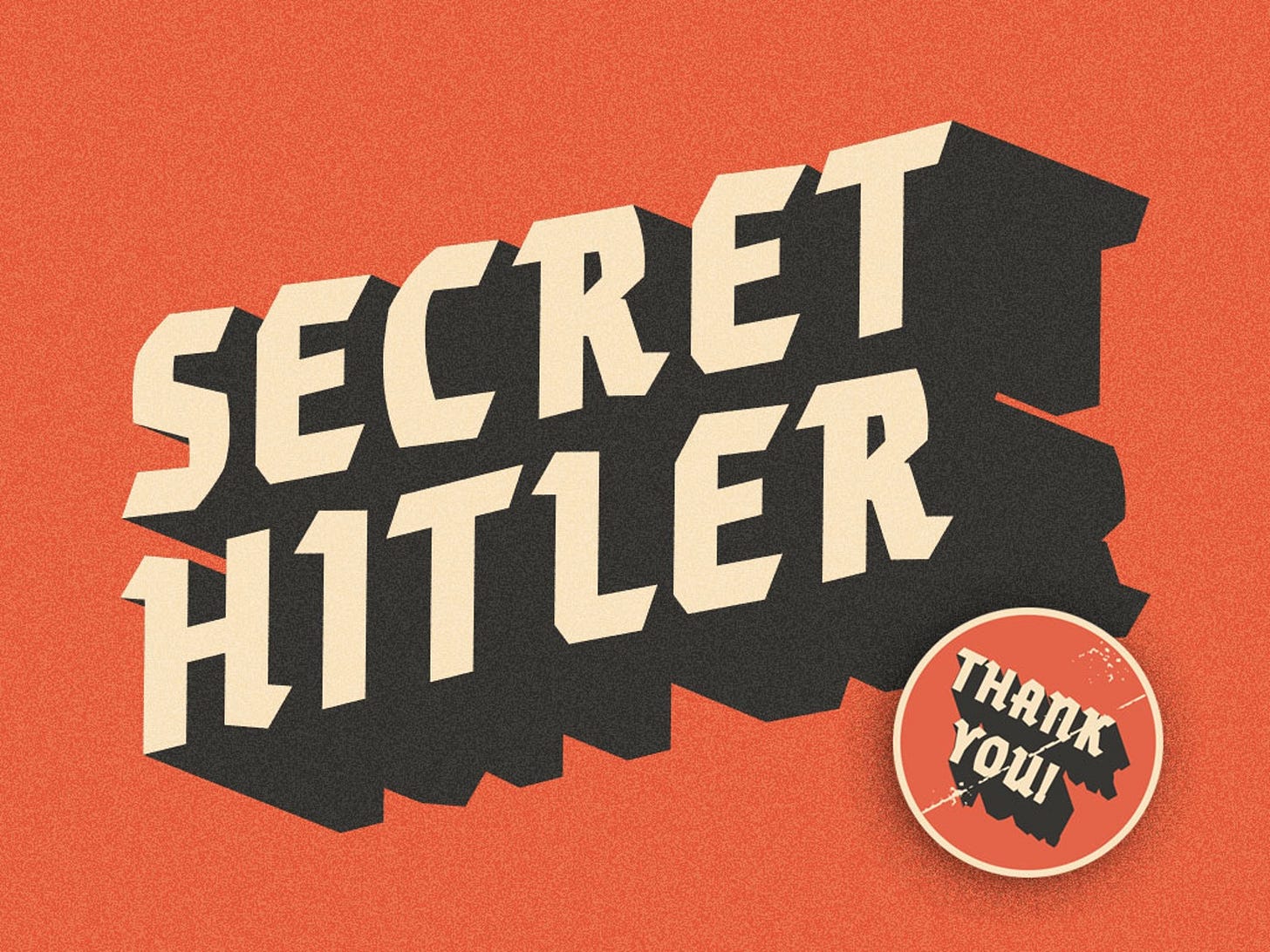
I spent a good amount of my last day at PAX playing a pick-up game of Secret Hitler, and I do not regret a single bit of it. Secret Hitler has the potential to become one of my favorite light card games, and that's a genre of game I hold in high esteem.
The rules to Secret Hitler are relatively simple. There are two teams: Liberals and Fascists. One of those Fascists is Hitler (secretly!). Fascists know who the other Fascists and Hitler are. Hitler and the Liberals don't know anyone's affiliation but their own. Every turn, a player is made President, who then gets to appoint a Chancellor. Everyone then votes on the arrangement. If it passes, the President gets to see 3 Agenda cards (which are either Liberal or Fascist), discard one, and pass the remaining two to the Chancellor, who then enacts one into law.
The Liberals win if either 5 Liberal Agendas are passed, or if Hitler is Assassinated (more on that in a second). The Fascists win if 6 Fascist Agendas are passed, or if, in the latter half of the game, Hitler is elected Chancellor.
The game is so simple, and yet, there are so many little design choices that make it a masterpiece. There are very few Liberal Agendas in the deck, meaning that a Liberal President and Liberal Chancellor might very well be forced to pass a Fascist Agenda. That's OK, though, because as Fascist Agendas are passed, powers are given to the President, like the ability to look at someone's team affiliation, or the ability to flat out Assassinate someone. With this in mind, Liberal players are tempted to let Fascist Policies slip by, in order to obtain some new powers. After all, a few Fascist Policies won't hurt, right?
Secret Hitler is extremely easy to teach, great to look at and hold, and leads to hours of fun as your group descends into absolute distrust, wondering how deep into a lie someone who's passed 3 Liberal Policies could really be. The feeling of panic that sets in when you peek into your private folder and see that you are, in fact, Hitler is all-consuming, and only matched by the feeling of intense glee when the President finally passes the Chancellor card to you, going "I dunno, you seem like a safe bet". The layers of this game, and the intricate web of behaviors you end up analyzing, trying your best to figure out if someone's a Fascist, or worse, is enthralling.
On top of that, there's something so fundamentally gross about playing Secret Hitler that makes it one-of-a-kind. That feeling of creating deep webs of lies, of playing side by side with your best friend every step of the way, only to stab them in the back at the very end, of feeling a Cheshire Cat smile creep across your face as you say "Well, thank you for electing me Chancellor, but I'm afraid I much prefer the title of Fuhrer" made me feel like a monster of a human being.
In case this hasn't sold you, like Karmaka, Secret Hitler also has a print-and-play available.
Things I Didn't/Couldn't Buy But Were Still Pretty Neat
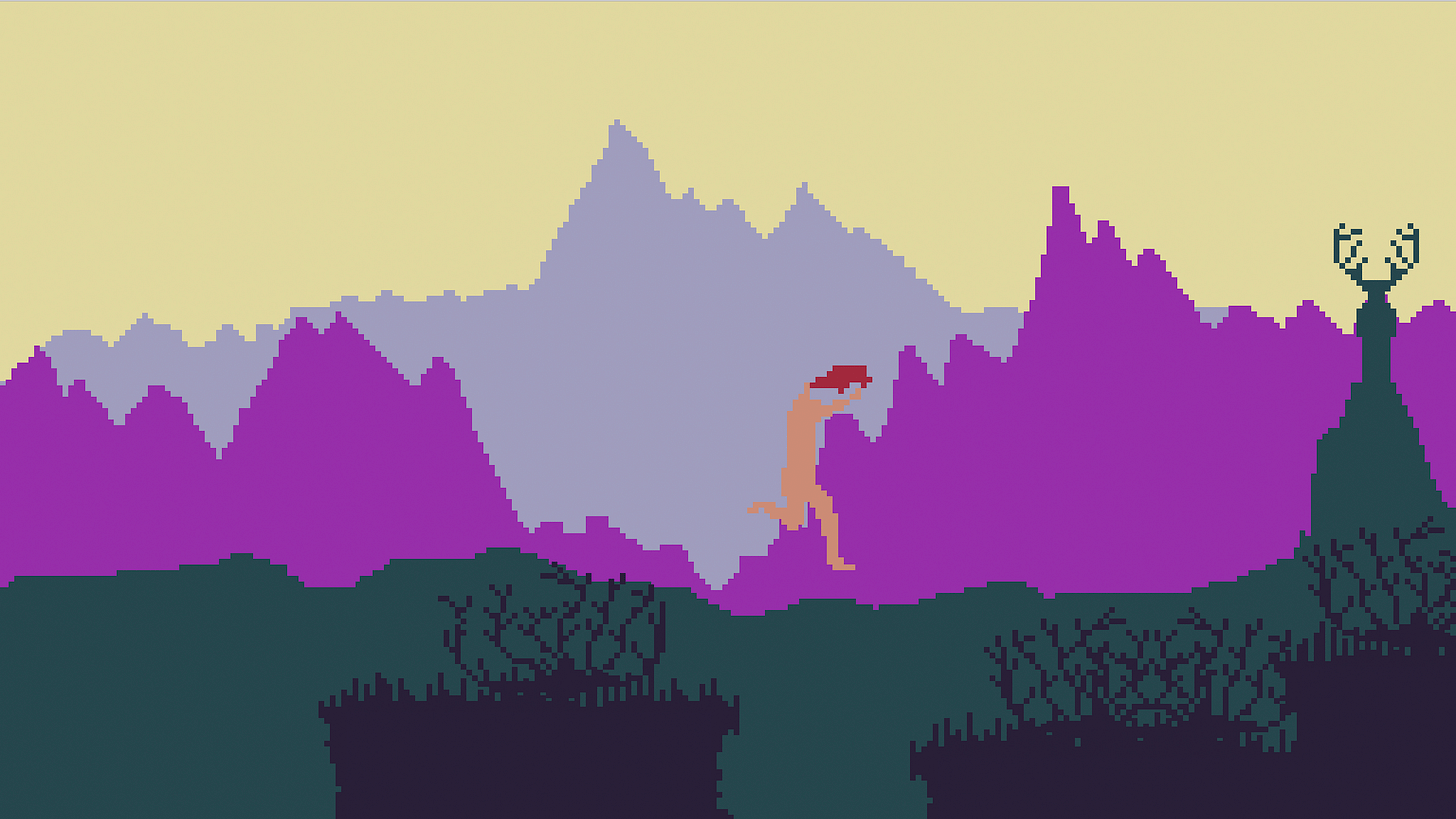
Please please please Greenlight this game. I want this in my home.
Den vänstra handens stig might be my personal game of the show. If it is a game is debatable, but how it is as an experience is indescribable.
In Den vänstra handens stig, you watch a protagonist, guided solely by AI, attempt to make his way through a brutal environment. He struggles as he must maintain everything from his energy to his temperature, as he attempts to climb and leap his way through unforgiving terrain laid out like a 2D platformer. He fails, often, only to reset to a checkpoint, and to have his AI attempt to develop a new strategy for the area, learning as he goes. As someone who has dabbled in AI, the constant learning of Den vänstra handens stig's hero, combined with the amount of game elements it has to juggle, is awe-inspiring. You can see the AI attempt to maximize energy whenever possible, sometimes attempting jumps far too early in an effort to determine exactly when it can cut a corner.
Combine all of this with the fantastic pixel animation, which truly captures the heft, weight, and most importantly suffering of the protagonist, and the game is truly enthralling. I watched the entire demo beginning to end, standing there, moaning and cringing as the hero made jumps to early or lost his handhold, falling to his death. When he made a jump he had been struggling on for so long, I screamed cheering.
The most fascinating thing, though, is the way you as a player interact with this game. You interact with a single, custom-made, button. This button, set in a wooden box with complex runes cut out, has a needle sticking out of it. In order to press the button, you must prick yourself with the needle and let your blood seep into the rune.
(Note: due to PAX rules, the needle actually had to be removed, which was a huge bummer)
What does the single button do? Simple. It makes the AI drop to his knees, give up, forget everything he's learned, and start over from square 1.
You have to understand, after I'd been standing there for thirty minutes, now heavily invested into the plight of this character, the second I saw someone inch near the button, I just about stabbed them. Soon, a ring of people formed around the button, providing a barrier so that no stray kid or jerk would ruin this experience.
There is so much that is fascinating about this game. There are hundreds of environments, which are uniquely configured for every game (the environments themselves are handcrafted, so this game isn't totally procedural). The background actually shows the silhouette of upcoming levels, increasing your investment in the protagonist's slog because I need to see what that deer skull tower is, dammit.
The most fascinating part of what I heard at the booth, though, was an ominous promise made by the developer: there is a reason that this character wants to reach the mountaintop far in the distance that serves as the end point of the game, and maybe, when you learn it, you'll want to press that button.
I loved every second I spent watching Den vänstra handens stig. I'm fascinated by the level design alone, and how it's perfectly crafted to gut the heart of anyone following this miserable little soul. I love the way it dangles mysteries in the far distance, as just one more way in which you want your sad protagonist to just MAKE THAT JUMP. I love the art style. I love the mood. I love the button. I love how, when I asked the developer if this is a game or not, he responded "I'm an adult, I don't have to answer that." This game, or whatever, is truly fascinating.
All I'll leave you with, then, to whet your curiosity a bit more, is to ask you to maybe try and figure out the significance of the title. I'll give you a hint: it's Swedish.
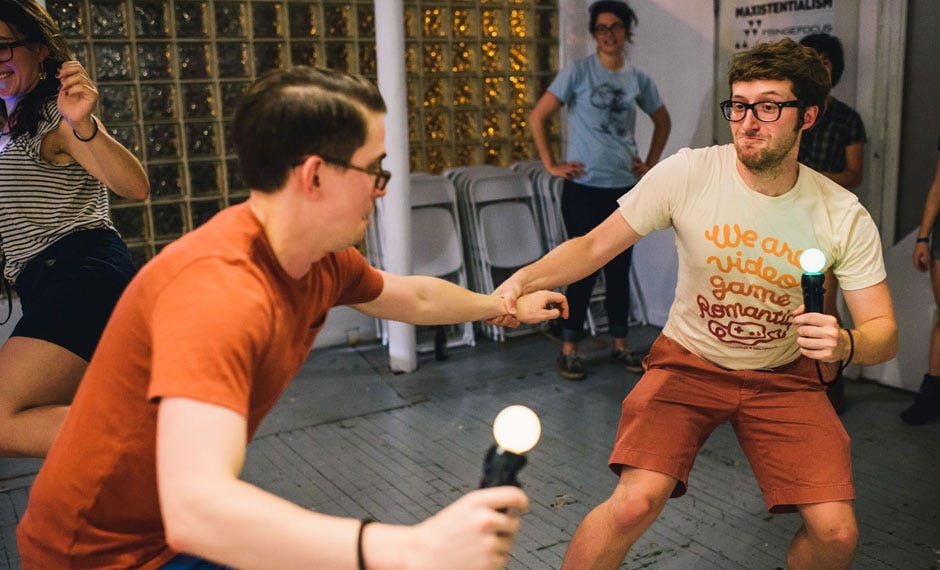
Dude, how have I not played Johann Sebastian Joust yet?
Johann Sebastian Joust, which came out in 2013 as part of the Sportsfriends bundle for PS3 and PS4, is a game that uses no screen or interface, just a set of Playstation Move Controllers and a soundtrack. The rules are brain-dead: you can only move as fast as the music. Move faster than that, you're out. Last one standing wins.
What this results in, though, is one of my favorite memories from the convention. A circle of people, all shifty-eyed, slowly scuttling towards one another as Taylor Swift's Shake It Off played so slowly I genuinely thought it was a vaporwave track at first. Suddenly, the track speeds up, and everyone races to each other. Johann Sebastian Joust is, after all, full contact, and as a result, you can slap, punch, and smack each other to try and jostle your opponent's controllers in an attempt to knock them out. I saw one round end with a roundhouse kick.
Suddenly, the command "FREEZE" booms over the music, and everyone stops in place. I look around me. Two people are closing in behind me. I see the shadow of someone behind me. We're all frozen. I'm doomed.
Johann Sebastian Joust does the impossible: it justifies the existence of the Playstation Move. I watched people fiddle about with Moves for a day and a half before I finally walked over and asked what they were playing, and I am so glad I did, because it is a blast.
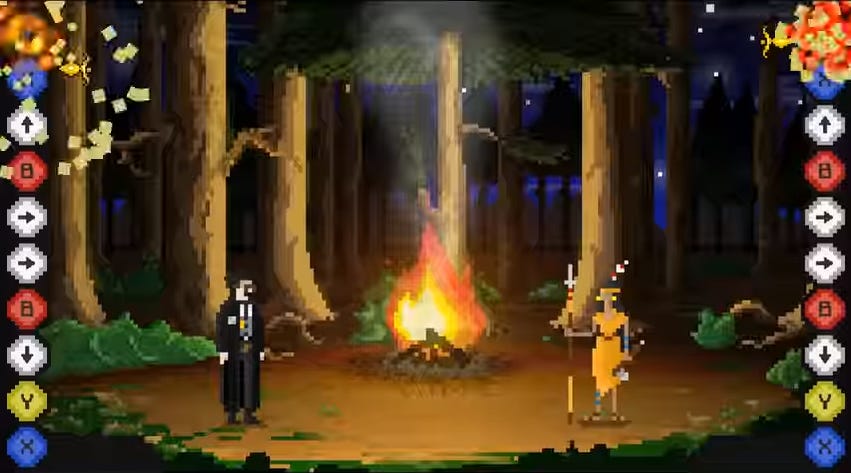
Somewhere in the middle of the expo floor, I saw a man in a cowboy hat by a booth covered in hay, with two people crushing it on a pair of DDR pads. I was hooked.
I'm noticing a theme here. All three of the games so far in this category are extremely simple, at least in terms of controls. Press a button. Move your arm. In the case of Western Press, the game is simply QTEs. Each player has a column of quicktime prompts, and whoever clears their column the best gets to take a shot. Best of three shots is the winner.
The key lies in what I said earlier: DDR pads. You can play this on a controller like a loser, or you can bust out the dance pad, and dance away your column of prompts instead of just pressing buttons like a controller philistine.
Honestly, I mention this game so highly for one simple observation that Western Press has made, one that I'm amazed it took so long to figure out: dancing on a DDR pad doesn't look like regular dancing, it looks like square dancing. When this clicked in my brain while playing Western Press, I grabbed my belt, shouted a "YEE HAH", and enjoyed the beautiful marriage of square dancing and murder.